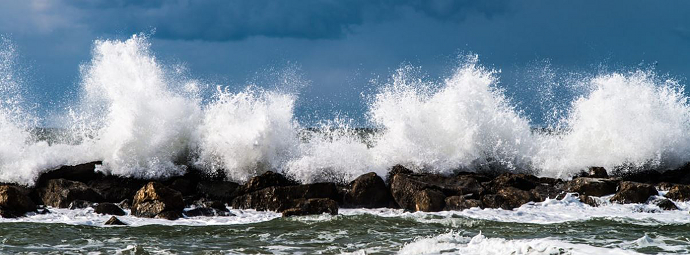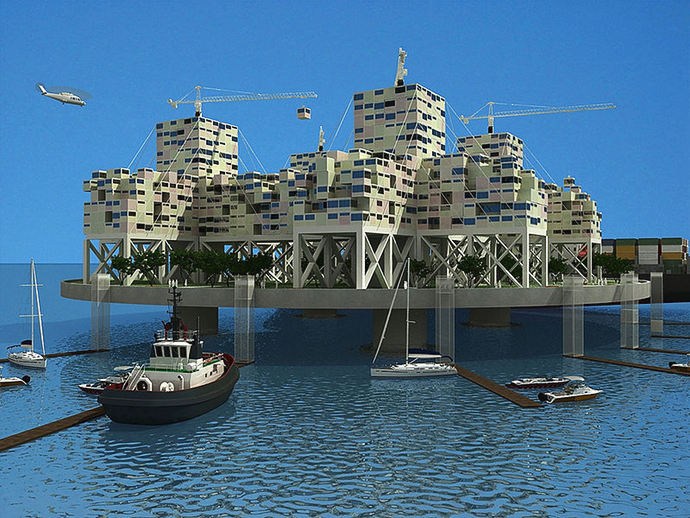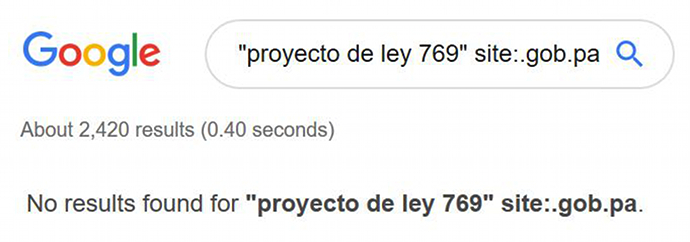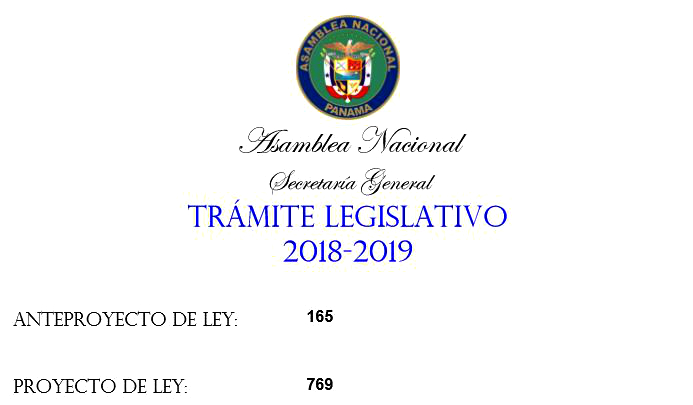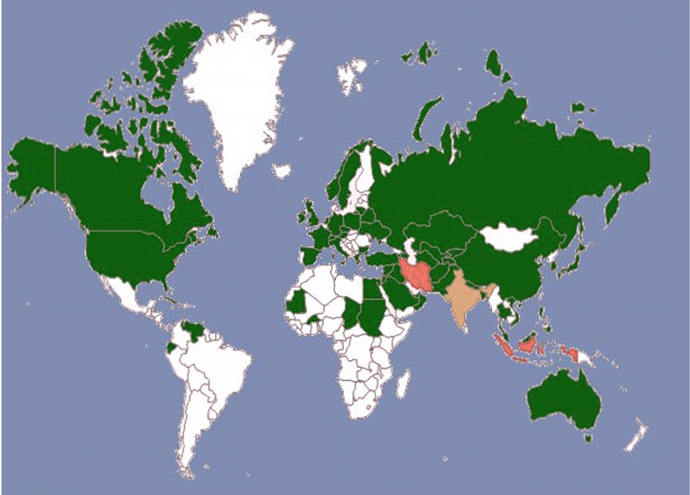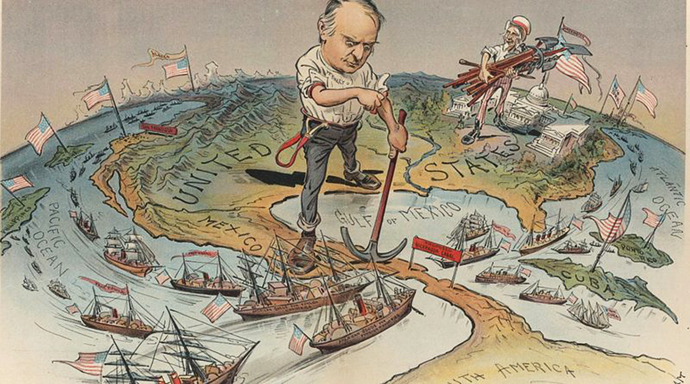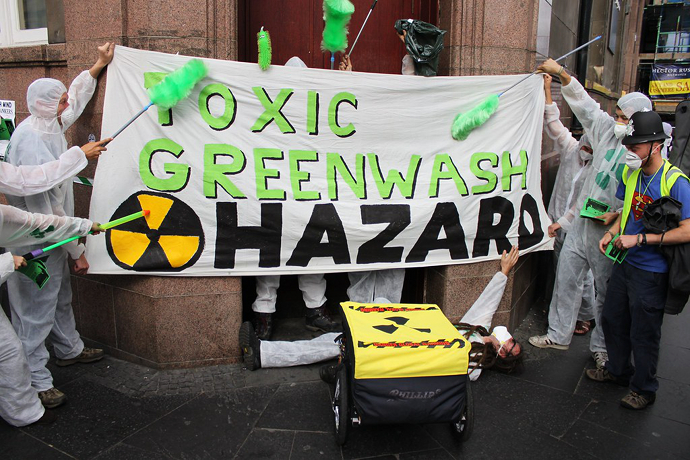As the latest US attack on Cuba shows, its purpose is to serve the neoliberal order. Image courtesy of Cornell University/Wikimedia Commons.
It’s official: the Monroe Doctrine is back
by Peter Bolton — Council on Hemispheric Affairs
In November 2013, then-Secretary of State John Kerry declared: “The era of the Monroe Doctrine is over.”1 The reality of Obama administration policy did not entirely support this assertion; there was the executive order against Venezuela in 2015, support for the coup in Honduras in 2009, and ominously close ties with right-wing governments across the region. But with other more encouraging steps such as the normalization of relations with Cuba and the (belated) show of support for the Colombian Peace Process, there were at least some modest steps towards greater mutual respect for national sovereignty in the Hemisphere. Then came the unexpected election of Donald Trump. Though throughout his election campaign he expressed a preference for US isolationism and opposition to senseless war, once in office he appointed the very neoconservative war hawks he had earlier criticized for engineering such foreign debacles as the disastrous invasion of Iraq. His appointments to hemispheric policy posts have been the least encouraging, with figures such as the convicted criminal Elliot Abrams reemerging from obscurity to saber-rattle against traditional Latin American foes. Ever since Trump entered the White House, there has been a growing sense that the Monroe Doctrine is back. Now, that suspicion has been confirmed. On April 17, National Security Advisor John Bolton said: “Today, we proudly proclaim for all to hear: the Monroe Doctrine is alive and well.”2
Latest move in ‘Troika of Tyranny’ Strategy
Bolton made the announcement during a speech in Miami to veterans of the CIA-orchestrated3 invasion of Cuba in 1961 – known in Cuban-American exile folklore as the “Bay of Pigs.” But the main purpose of the speech was to make public the latest addition to his so-called “Troika of Tyranny” strategy: a new punitive measure against Cuba to add to the already crippling array of sanctions, isolation tactics, and trade prohibitions that make up the decades-long economic blockade.4 Having severely, though not entirely,5 rolled back the Obama-era normalization process, the Trump administration now considers property in Cuba that was seized by the Cuban government from “Americans” to be open game for lawsuits.6 It was unclear whether he was referring to US citizens generally, Cuban exiles specifically or any US resident, but he indicated that foreign companies with any business dealings relating to expropriated property will be subject to possible lawsuits. He stated: “Americans who have had their private and hard-earned property stolen in Cuba will finally be allowed to sue.”7
The measure will be implemented by reactivating a provision of the notorious Helms-Burton Act that up until now had been suspended since the Clinton administration.8 Known as “Title III,” the clause allows lawsuits against foreign companies that have “trafficked” or otherwise benefited from the use of property seized since the beginning of the Cuban Revolution in 1959.9 Such property is believed to include a wide range of real estate including residential houses and investments in the tourism industry such as hotels and ports used by cruise companies.10 Bolton also indicated that those who “traffic” in this “stolen” property will be denied visas to enter the United States.11
International condemnation
The move has been widely condemned across the world including by Canada and multiple US allies in Europe who have warned of potential counter-lawsuits in response and pledged to challenge the move through the World Trade Organization.12 In anticipation of Wednesday’s announcement, European Commission foreign policy chief Federica Mogherini and European Trade Commissioner Cecilia Malmström said to Secretary of State Mike Pompeo in a joint letter sent on April 10 that “the issue of outstanding US claims should not be conflated with the cause of furthering democracy and human rights in Cuba.”13 Similarly, Canadian Minister of Foreign Affairs Chrystia Freeland released a statement on Wednesday saying that “Canada is deeply disappointed with today’s announcement.”14
The new sanctions come as the US has become ever more isolated on its policy toward Cuba. Last November, all but four of the 193 nations of the United Nations General Assembly voted in favor of a resolution condemning the blockade.15 The two “No” votes, unsurprisingly, came from the US and Israel (with two other nations casting abstentions). Similar resolutions have been passed by the General Assembly with a majority in favor every year since 1992 on the basis that the blockade is a violation of international law and the UN Charter.16 This adds to decades-long condemnation from a wide array of international NGOs who have voiced their criticism. The Inter-American Commission on Human Rights, for instance, has stated that “the economic sanctions [that make up the blockade] have an impact on the Cuban people’s human rights, and therefore [we urge] that the embargo be lifted.”17 The Center for International Policy, meanwhile, has stated that the blockade has “created a situation of scarcity and uncertainty that has affected all aspects of Cuban society, including its healthcare system.”18
Challenging the absolutist stance on private property
An exhaustive list of such statements would be far too long to enumerate here. But there is something more significant still that lies behind this latest punitive measure. It illustrates how the Monroe Doctrine has evolved to become intricately linked with the imposition and maintenance of the global neoliberal order. This is because it shines a light on the most fundamental factor that has motivated US hostility against Cuba since 1959. As the late Saul Landau pointed out, this hostility was never predicated on human rights concerns;19 how could it be when the US has held lasting alliances with countries such as Saudi Arabia, Israel, Colombia and Honduras, which, if anything, have much worse human rights records than Cuba? Rather, it was the nationalization of US-owned assets by the revolutionary government – such as the agro-industrial corporations that controlled much of Cuba’s agricultural sector – that to this day represents the cardinal sin. Threatening US economic interests is the one thing that Washington never forgives. For those countries that do serve Washington’s economic interests, on the other hand, there is practically nothing it won’t overlook. Indeed, President Trump all but spelled this out when he stated recently that the US’s relationship with the brutal Saudi dictatorship will continue since it’s good for business.20
This latest move also strikes at the heart of the absolutist stance that Washington takes toward the concept of private property, which to a large extent underpins its entire neoliberal and imperialist value system. For Washington, the legitimacy of its own vision of private property is beyond question, an unassailable moral absolute without caveat. So long, that is, as such property relations are to the benefit of corporate power. The fact that multinational corporations routinely violate the property rights of others21 – not to mention environmental, labor and consumer rights – is obfuscated under the twisted logic of neoliberal capitalism. Indeed, this fundamentally hypocritical vision of property relations forms a large part of prevailing neoliberal assumptions. Private ownership and so-called “competition” amongst private actors are deified, while concepts such as “the commons” or “the public square” are demeaned and denigrated at every turn.22 The role of the state is whittled down to enforcing the contractual relations of capitalism and social control, while beneficial state functions such as instituting social protections, providing access to public services, protecting the biosphere, and ensuring responsible regulation of the economy are dispensed with.
Putting things in context
The historical context in Cuba provides the perfect illustration of this tendency. As the 1950s drew to a close, the Batista dictatorship had tightened its grip on power and was ruling with an iron fist. And in addition to the suffering caused by many of the pathologies typical to Latin American countries of the time (and in many cases continuing to this day) – the rampant poverty and inequality,23 the tragic rates of illiteracy,24 and the widespread lack of access to even basic public services25 – Cuba had the added pathology of mob infiltration into myriad spheres of the island’s economy and wider society.26 As historian Arthur Schlesinger Jr. wrote at the time: “The corruption of the Government, the brutality of the police, the government’s indifference to the needs of the people for education, medical care, housing, for social justice and economic justice… is an open invitation to revolution.”27 Naturally, none of this mattered to Washington, which strenuously backed the Batista dictatorship since it was obediently obeying orders and creating a favorable business environment for powerful US multinational corporations.28
Though such a reality does not necessarily justify the nature or the extent of the expropriation process that took place in the early days of the revolution, it does highlight the fact that the distribution of wealth and resources in Cuban society was far from beyond moral reevaluation before the revolution either. Indeed, such political and philosophical questions surrounding the concepts of property ownership and wealth distribution are – and ought to be – constantly subjected to debate and readjustment in all societies. The 20th Century saw a huge divergence in the paths that different countries took on these matters – on both sides of the Iron Curtain. Obviously the Eastern Bloc countries moved toward the highly state-led “command economies” that came to characterize the Soviet system. And as much as post-Cold War propaganda says otherwise, this system did have some benefits,29 especially when contrasted with the disastrous consequences of the transition to neoliberalism that has taken place in post-Soviet Eastern Europe.30 But even within the borders of many US Western European allies there has been considerable diversity. Social democratic governments experimented with differing configurations of state and private ownership for the various sectors of the economy. Even the trenchant US ally, Great Britain, brought sectors such as transport, electricity, water, telecommunications, mining and even some heavy industry into public ownership in the post-war period.31 And of course, like every other Western European country,32 Britain also established a publicly administered universal healthcare system33 and brought a significant proportion of its housing stock into public ownership too.34
The so-called “free” market neoliberal path taken by the United States, especially since the late 1970s, and subsequently adopted across large swaths of the world, hardly compares favorably to either Western European countries under social democracy or even to post-1959 Cuba. Whereas in the United States (the wealthiest country in the world, lest we forget) empty homes outnumber homeless people by six to one,35 in Cuba homelessness is virtually nonexistent.36 Similarly, whereas in the United States several tens of thousands of people die every year due to a lack of access to healthcare,37 Cuba’s universal system is free-at-the-point-of-service and leaves no one without care.38 Remember that on both counts Cuba has a superior record despite being a much poorer country, which furthermore has suffered for decades under an economic blockade from the world’s superpower that, according to the UN, has cost its economy over $100 billion dollars throughout the decades.39 Such comparisons again expose the inherent contradictions and inhumanity of neoliberal ideology.
Separating fact from fiction
It must also be remembered that the realities of the process of expropriation in Cuba have been heavily distorted by the historical fictions that make up Cuban-American exile mythology. According to this belief system, the tyrannical Fidel Castro seized for himself everything from everyone so that all but he might be equal. The reality is far more nuanced than this picture suggests. For one thing, the Cuban exiles who left in the early days of the revolution abandoned their properties as they fled for Yankee shores. (And many of them did so long before the country officially embraced communism in late 1965 – almost six years after Castro seized power from Batista.) So they could not have reasonably expected to have them returned to them no matter what political and economic system Cuba eventually adopted. Furthermore, Fidel Castro made clear that expropriation would apply to everyone, including him and his cadre of revolutionaries themselves. Indeed, one of the very first things that his government nationalized after the revolution was his own family farm in the island’s Oriente province.40
But there is deeper nuance still to the expropriation process. For instance, some of the private property that the revolutionary government seized after 1959 had itself been unjustly seized from rural peasants during the Batista dictatorship for the benefit of multinational corporations such as the United Fruit Company.41 Redressing this kind of injustice that for decades had been done to Cuba’s campesinos was a central pillar of Fidel Castro’s political program since long before 1959. He initially indicated support for some kind of land reform and nationalization program in his famous 1953 speech “History Will Absolve Me.”42 The debate surrounding land reform and campesino struggles in its support continue to this day across Latin America. And some features of the Cuban experience have served as a model for land reform efforts ever since, whether it be in Honduras, Venezuela or Colombia. To be sure, reasonable people can certainly disagree about whether or not this process of expropriation went too far. But the process of expropriation was not the wanton, indiscriminate theft portrayed by the hardliner Cuban-American exile faction and nor did the situation in Cuba before the revolution represent an ideal model of property relations and resource distribution either.
The indigenous genocide and US hypocrisy
Finally, this entire episode raises serious issues of hypocrisy in light of historical realities and a flagrant lack of even-handedness. And this also ought to be put in context. To give just one example, in a cruel irony the US has violated Cuba’s land sovereignty rights for years through its illegal occupation of Guantanamo Bay,43 where it houses both a Naval Base and a detention center where people have been continually subjected to torture, rendition and indefinite detention without trial (all of which is illegal under international law).44 But there is a historical context that stretches back much further. Undoubtedly one of the most egregious thefts of all history has been the stealing of lands from the indigenous peoples of the Americas. Note that on John Bolton’s own system of values, in which stolen property must be returned to its rightful owners, the whole North American continent would have to be returned to its Native American tribes – which exposes its inherent absurdity. But leaving this aside, the Trump administration (like all US administrations before it) is not even willing to respect existing Native American treaties.45 And far from representing some kind of historical relic, the legacy of land theft and ethnic cleansing continues in the United States46 and throughout the Hemisphere to this day47 – as does the struggle of Indigenous peoples in defense of their lands. Indeed, the Trump administration has been accelerating the sale of leases to oil and gas companies on both Native American48 and public federal land.49 So while on the one hand it is demanding compensation for property seized in a foreign sovereign state where the United States has no jurisdiction, the administration is simultaneously accelerating a centuries-long process of dispossession within its own borders. If the Trump administration wishes to get serious about making restitution for past injustices and returning to injured parties what is rightfully theirs, this travesty taking place within the United States would be a better place to start than playing into the Cuban-American exile hardliner narrative for political gain.
But, of course, since this violation runs contrary to neoliberal imperatives it is conveniently ignored. The grievance of the hardline Cuban exiles, meanwhile, has the double benefit reinforcing the ideological narratives of both the Monroe Doctrine and the neoliberal agenda that it has come to serve. Sadly, under this latest reality TV-inspired form of manufacturing consent for neoliberalism and imperialism created by Trumpism, we are moving into an era of the Monroe Doctrine on steroids. And that creates an even greater imperative for progressive voices to oppose it.
These links are interactive — click on the boxes






